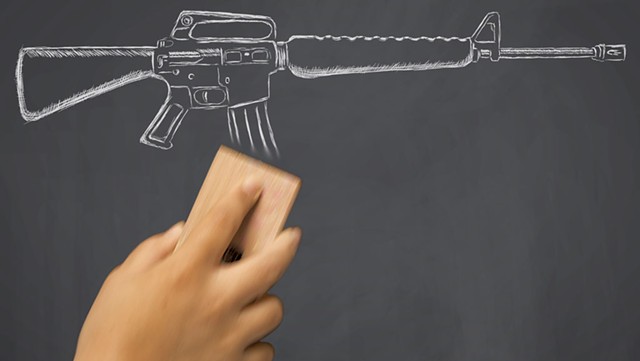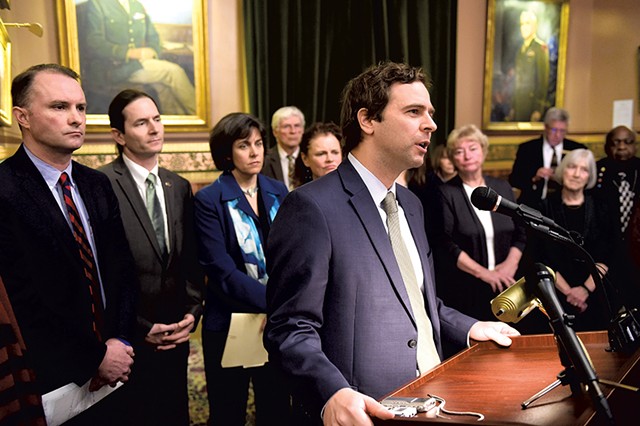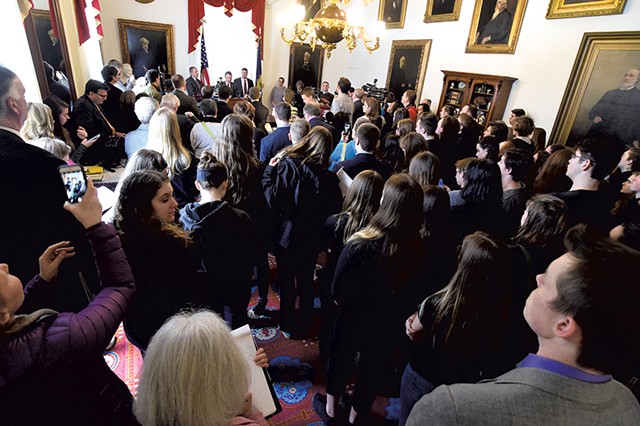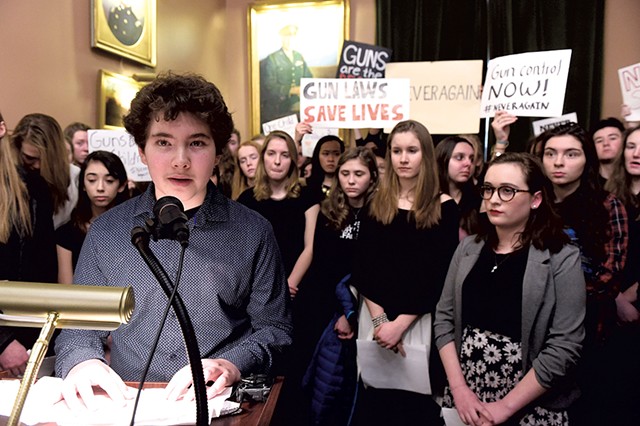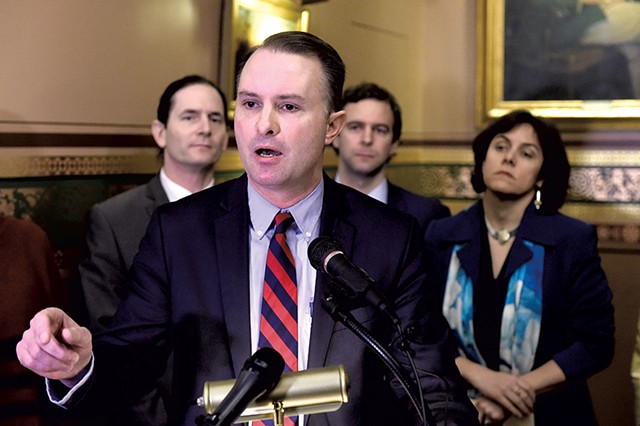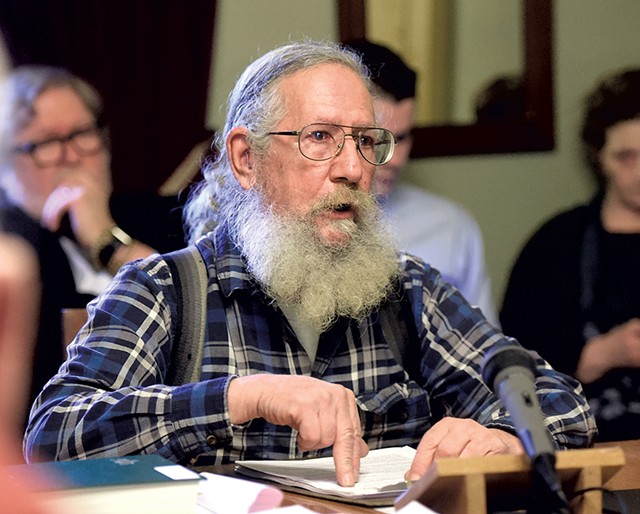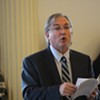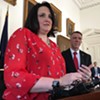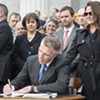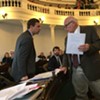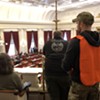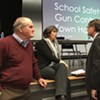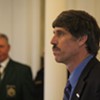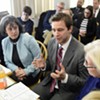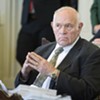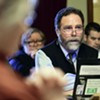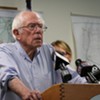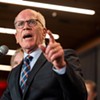Switch to the mobile version of this page.
Vermont's Independent Voice
- News
- Arts+Culture
- Home+Design
- Food
- Cannabis
- Music
- On Screen
- Events
- Jobs
- Obituaries
- Classifieds
- Personals
Browse News
Departments
Browse Arts + Culture
View All
local resources
Browse Food + Drink
View All
Browse Cannabis
View All
-
Business

Cannabis Company Could Lose License for Using…
-
Culture

'Cannasations' Podcaster Kris Brown Aims to 'Humanize'…
-
True 802

A Burlington Cannabis Shop Plans to Host…
-
Business

Judge Tosses Burlington Cannabiz Owner's Lawsuit
-
Health + Fitness

Vermont's Cannabis Nurse Hotline Answers Health Questions…
Browse Music
Browse On Screen
Browse Events
View All
Quick Links
Browse Classifieds
Browse Personals
-

If you're looking for "I Spys," dating or LTRs, this is your scene.
View Profiles
Special Reports
Pubs+More
In Range: The Week That Changed Vermont's Gun Politics
Published February 28, 2018 at 10:00 a.m. | Updated August 13, 2019 at 9:14 p.m.
Gov. Phil Scott was sitting alone in his ceremonial Statehouse office when his top aide walked in and handed him a small stack of papers.
"You might want to take a few minutes to read this through," chief of staff Jason Gibbs told his boss.
It was late morning on Friday, February 16. Three days earlier, according to the Vermont State Police, 18-year-old Jack Sawyer had purchased a 12-gauge, pump-action shotgun at Dick's Sporting Goods in Rutland in order to kill "as many as I can get" at Fair Haven Union High School.
Gibbs had been briefing his boss since the Poultney teen's arrest the day before. Now he handed Scott a 13-page police affidavit filled with disturbing details and left the room to "give him some space."
Scott pored over the document, which detailed Sawyer's preparations for a Columbine-style massacre that would begin with the shooting of a Fair Haven police officer detailed to the school and end with his own suicide.
The affidavit revealed the methodical nature of Sawyer's planning and quoted from what he called his "Journal of an Active Shooter." At the same time, the police document painted a picture of a lost and alienated young man who had been hungry, homeless and hopeless.
View an interactive timeline of Vermont's gun politics shift.
"I remember some of the sensations as I was reading it," the governor recalled. "I remember the shock, the guilt, the relief ... and a bit of anger, as well." Guilt, he elaborated, "that I could be so naïve" as to think that Vermont would escape America's epidemic of mass shootings. Anger that somebody "would take the lives of innocent kids."
It was then that a switch flipped in the governor's head.
For most of his 59 years, the blue-collar son of Barre had instinctively aligned with Vermont's traditional sportsman's culture. He grew up hunting and fishing and still owns nearly a dozen rifles and shotguns. Throughout his political career, Scott had opposed all forms of gun control, calling the issue a "distraction" in his 2016 gubernatorial campaign and earning an A rating from the National Rifle Association.
Just the day before, following a school shooting in Parkland, Fla., he'd told Seven Days that Vermont had "balanced" gun laws and needed no more of them.
But now, sitting with his back turned to a window overlooking the Statehouse lawn, he was second-guessing the way he'd seen the world.
"I'm sure each and every one of us has had a close call in their lifetime ... and you just say, 'I'm never going to do that again,'" he explained. "This was one of those situations where I feel like I was given a second chance to help avoid a catastrophic event. And I was determined not to let it slip through my fingers."
Scott grabbed the papers in front of him, flipped them over and started writing. "I wanted to make sure I captured how I was feeling," he said.
That afternoon, Scott delivered the words he'd written, almost verbatim, to a room full of reporters.
"To be quite honest with you, in the aftermath of Florida, this situation in Fair Haven has jolted me," Scott told them. It was time for "an honest, open and fact-based discussion about access to guns by those who shouldn't have them." Asked whether that meant he was suddenly open to gun-control legislation he had opposed just a day earlier, the governor said, "Everything should be on the table."
What he meant by that, even Scott himself didn't exactly know. "I had an idea that I wanted to do something," he later recalled.
But in saying those words, Scott did what no other Vermont governor in recent memory — Republican nor Democrat — had been willing to do. He had thrown open the door to meaningful action on one of the most divisive issues in the state. Now every politician in Vermont, Scott included, had to figure out and articulate where he or she stood on gun rights in the age of school shootings.
It was the start of a week that would radically transform the politics of firearms in Vermont.
'Jack Shit'
click to enlarge 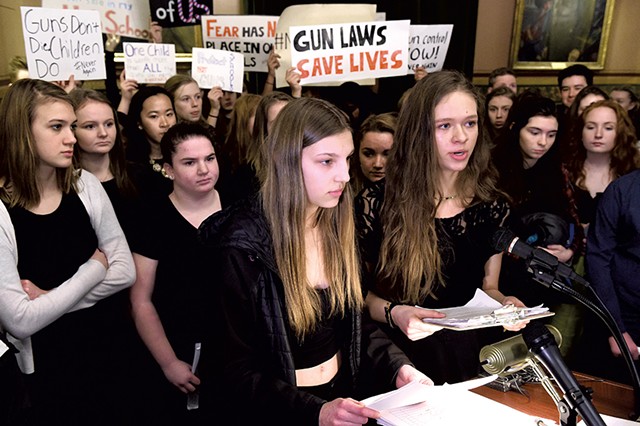

- Jeb Wallace-brodeur
- Montpelier High School juniors Nadia Scoppettone (center) and Emma Harter (right)
For years, Sen. Phil Baruth (D/P-Chittenden) felt like he was stuck on a raft and lost at sea. The University of Vermont English professor had tried to cajole his colleagues into debating gun control, but he'd succeeded only in alienating them.
In January 2013, a month after a gunman killed 26 students and teachers at Connecticut's Sandy Hook Elementary School, Baruth introduced legislation to ban assault weapons and high-capacity magazines in Vermont. But within five days — after a tremendous backlash from fellow Democratic senators — he withdrew the legislation.
"It is painfully clear to me that little support exists in the Vermont Statehouse for this sort of bill," Baruth explained at the time.
That dynamic was nothing new in Vermont, where Republicans, Democrats and even Progressives had long agreed that less was more when it came to gun regulation. Despite its liberal leanings, the Green Mountain State had — and still has — among the fewest gun laws in the nation.
A group founded in the wake of Sandy Hook, Gun Sense Vermont, tried to change that. But its quest for universal background checks was stymied, year after year, by two immovable obstacles: Democratic governor Peter Shumlin and Senate Judiciary Committee chair Dick Sears (D-Bennington), both ardent gun-rights supporters.
When a Gun Sense bill eventually made it to Sears' committee in 2015, he stripped out the background check provision on a 3-2 vote and sent a watered-down version to Shumlin, who signed it, reluctantly, behind closed doors. It was the best gun-control advocates could do.
Baruth didn't give up. In January 2017, he introduced another universal background-check bill, this one known as S.6. A new Senate president pro tempore, Tim Ashe (D/P-Chittenden), supported it in principle but was unwilling to use the powers of his position to force it through the 3-2 logjam in Sears' committee.
"I think there was a period of time where [Ashe] was deferring to the committee chair because he's an institutionalist," Baruth said.
Last fall, Ashe began meeting with Sears and Baruth to see if he could find a path forward. "My goal has been to allow a full discussion and debate on universal background checks without forcing a committee to vote a bill out that it doesn't support," Ashe explained.
In recent weeks, according to all three, they'd reached a tentative deal to allow a vote on the Senate floor, though the bill's prospects of passage remained murky. Then, on Wednesday, February 14, a 19-year-old gunman burst into a Florida school and killed 17 people. The next day — just as police were arresting Sawyer in Fair Haven — Baruth exploded in an interview with Seven Days.
"We are doing jack shit about a problem that's every bit as pressing nationwide as the opioid epidemic," he said, nearly blowing up a deal he'd worked so hard to reach. "The Vermont Senate should be ashamed of itself to have to sit in this position again."
'It's a Different World'
That same Thursday evening, hours after Sawyer's arrest, House Speaker Mitzi Johnson (D-South Hero) was eating dinner with a bipartisan group of friends at a Montpelier apartment Rep. Bob Helm (R-Fair Haven) shares with two other legislators.
"We hadn't discussed Florida at all," Johnson recalled, referring to the previous day's school shooting. "It was just like, 'How're your kids? How are you doing?' Normal dinner." Sen. Jane Kitchel (D-Caledonia) spent the evening "trying to tell these three guys how to cook pork tenderloin, which they were struggling with," Johnson recalled.
After dinner, as the group milled around the kitchen, the speaker noticed a text message from Gibbs, the governor's chief of staff. She asked Helm if she could make a call in his living room.
In their conversation, Gibbs told Johnson that police had arrested Sawyer and were just beginning to understand his plan for a mass shooting in the district Helm had represented for 27 years.
"[Gibbs] walked me through everything, and I'm just sitting in a 1970s easy chair listening to all the pieces of what unfolded," she said. "Bob's just sort of leaning up against the fridge, and the guys are cleaning up from dinner, and it was one of those things, like, 'Oh, God. I wonder if Bob knows this kid.'"
"I went back into the kitchen and said, 'Hey guys, you're going to want to hear this," she said.
Helm immediately texted the Fair Haven police chief to find out what he could. The longtime legislator didn't know Sawyer, but he was acquainted with the suspect's grandmother. Later, when he read the affidavit, Helm imagined the tragedy playing out in the halls of the high school from which he'd graduated decades earlier.
"It would have been a mess," he said, inhaling sharply. "Yeah, definitely they need some high security in that school and all schools in the state."
A life member of the NRA, Helm had previously opposed all forms of gun control. But now he was even considering supporting universal background checks.
"It's a different world than we had 20 years ago," he said. "And I guess guys like me have to start admitting to that — and coming partway, anyways."
'Hug the People Around You'
It took time for Johnson and her fellow legislators to process what had nearly befallen the state. For House Majority Leader Jill Krowinski (D-Burlington), that moment came during a dinner with a teacher friend. As they discussed the Florida and Fair Haven incidents, the friend spoke of her family's plan in the event of a shooting at the school where she taught.
"And I just — I was like — I was barely keeping it together. 'I can't believe we're having this conversation,'" Krowinski recalled saying, choking up as she told the story. "For me, at that moment, it got even more real than I thought it could."
For Johnson, the moment came around 6 p.m. that Friday, nearly 24 hours after she'd heard the news from Gibbs. The speaker sat down on her couch and, for the first time, reviewed the pages of the affidavit the governor had studied that morning.
"I just read this young man's story, just crying," she said, tearing up again. "Because I saw all of these pieces of hunger, of being alone. You know, he talks about not having anything but crackers to eat."
Johnson took in Sawyer's tale, considered policy remedies, then emailed Krowinski and the rest of the House leadership team.
"Sobering does not begin to describe this affidavit. Hunger, poverty, mental illness, easy access to weapons, hopelessness, loneliness and anger conspired to create a narrowly avoided tragedy," Johnson wrote. "Hug the people — especially the kids — around you. Then let's work like hell to erode all the conditions that contribute to these far-too-frequent shootings."
Later that night, after sending the email, Johnson read the statement Scott had written that morning and delivered that afternoon, calling for a "discussion about access to guns by those who shouldn't have them."
"Having just read [the affidavit], I could tell that [Scott] had read it," she said. "And that little piece was — just him opening that door — I think gave me the first piece of hope that maybe we could have a real conversation about this in Vermont."
'Let's Do All We Can'
As Johnson prepared to mobilize the House, Scott spent the weekend pondering the paths ahead of him. He urged his friends and his wife, Diana, to read the police document that had changed his mind so quickly.
"I wanted them to understand, and it always came back to, 'You need to read the affidavit,'" he said. "'You need to know how I'm feeling right now.'"
Not everyone in the governor's life saw it the way he did.
"I don't like to disappoint people, especially my friends and those who believe that they're doing the right thing — and I'm disappointing them," he said, noting that he's close to many gun-rights supporters. "And sometimes there's anger involved in those discussions."
At Scott's direction, Gibbs spent the weekend pulling together a list of policy options. "It was clear to me that he was going to not only welcome all ideas but put some ideas on the table himself," Gibbs said.
Secretary of Human Services Al Gobeille had reacted skeptically to the governor's initial address. "When I heard 'do something' on Friday, I didn't know what that meant," he said. But when Scott convened his cabinet four days later, on Tuesday, February 20, it was clear that the governor was serious. "I knew something major was going to happen," Gobeille said.
Scott opened the discussion in his Statehouse office by asking his secretaries and commissioners what they thought he should do.
"I think he was using the cabinet as an opportunity to develop his thinking," said Secretary of Education Rebecca Holcombe. "There was a pretty diverse set of opinions. There are people who would have taken a more political approach, but the governor in that moment didn't take that path."
Unlike Gibbs and the rest of Scott's executive office staff — largely conservative politicos who worked on his campaign — the governor's cabinet is a heterogeneous mix of moderates, technocrats and even the occasional Democrat. Several have military backgrounds, some previously worked in law enforcement and most are parents.
"My kids are at U-32, and those events could have just as easily transpired at their school as at any other school in the state," Secretary of Natural Resources Julie Moore explained. "I think that just makes it much more real and raw for folks."
Moore, a Democrat, urged the governor to consider some of the bills the legislature was already debating, including ones that would mandate background checks and allow authorities to seize weapons from those who pose a risk of violence.
Scott spent most of the meeting listening and asking questions, according to Secretary of Commerce Mike Schirling, but he did not appear interested in delaying action. "There was a clear sense of urgency," Schirling said.
When the meeting concluded, Scott asked Gibbs for a read on what the cabinet was prescribing. "I think they want us to be aggressive," his chief of staff responded.
"I agree," the governor said. "That's how I feel. Let's do all we can."
'Enough Is Enough'
As Scott's team pondered its options, Vermont Democrats were finding their footing in a changed landscape. The moment offered both risk and reward: Those who had long sought stricter gun laws suddenly had license from the governor to pursue them. But if Democrats misread the mood and did too much or too little, voters would surely hold them accountable.
Around the time Scott met with his cabinet, on Tuesday, February 20, Attorney General T.J. Donovan, a proponent of universal background checks, was meeting with his own staff. "The first thing we said was, 'Let's do something,'" Donovan said. "'Let's call Mitzi and Tim and see if we can do something.'"
By then, according to Ashe, the pro tem had "made clear to the Senate that we were having a universal background-check vote." While Sears and other old bulls of the Senate remained miffed at Baruth for his "jack shit" comment the previous week, the Judiciary Committee chair was not going to stand in his path.
After years at sea on his metaphorical raft, Baruth said, it was like "having a wave come along and lift you to the shore."
Sears summoned his own nautical metaphor: "It's a sea change," he said. "This issue has roused the Vermont public in a way I haven't seen since civil unions."
Last Thursday — a week after Sawyer's arrest — middle and high school students flooded the Vermont Statehouse, some holding signs and many wearing black. Like their counterparts at the Florida school, whose advocacy had sparked a national debate over gun control, these young Vermonters had some demands for their elders.
But before holding their own press conference in the Cedar Creek Room, they listened attentively as the state's top Democrats and Progressives announced a unified strategy. Standing together at a podium, Ashe, Johnson, Donovan and Lt. Gov. David Zuckerman formally threw their support behind three pieces of legislation: Baruth's universal background-check measure and two bills allowing authorities to confiscate guns from those who pose a risk to themselves or others. "Enough is enough, and we will be taking action," Ashe said.
But even they had limits. The politicians appeared cool to the concept of an assault weapons ban — and Johnson suggested she couldn't guarantee a House floor vote on background checks.
When their turn at the podium came, the students also said they'd had enough.
"We are here today to let politicians know that we are angry, terrified and fed up with the crisis our country is facing, and we will not accept the lax gun laws present today that continually allow for tragedies," Montpelier High School junior Nadia Scoppettone said.
Gabriel Groveman, an eighth grader at Twinfield Union School, told the crowd that, every month, he and his classmates had to practice "locking our doors, shutting off the lights and hiding silent in the corner" to evade a potential shooter. "I, for one, am tired of hiding silent in the corner," he said.
As the students spoke, Democratic and Republican legislative leaders filed into the governor's Statehouse office next door. There, Scott outlined his own policy plan, which Gibbs had prepared: a five-page memo that, in some ways, surpassed even what Democrats had offered.
In addition to supporting the two gun confiscation bills, the governor said he'd seek to ban bump stocks, which enable guns to fire faster, and raise the legal age to buy firearms to 21. He requested $5 million for school security grants and said he'd directed his administration to conduct renewed security assessments at every Vermont school.
Scott's list, Ashe said, "was much broader than any of us had anticipated."
After briefing legislators, Scott held a press conference of his own to unveil the memo to the public. "I want to be clear: These are my recommendations," the governor said, as many of the students who'd just held their own press conference looked on. "But as I've said before ... I'm open to additional ideas and ongoing discussion."
He meant it. As Scott answered questions from the media, he appeared to sign on to two additional policies left unmentioned in the memo: He said he was "open" to banning the sale of high-capacity magazines: "I don't know for myself personally that a 30-round magazine is something anyone needs." And he said he "would probably support" universal background checks if a bill such as Baruth's reached his desk.
"I've evolved on this," Scott explained. "Where I was a week or two ago has changed completely."
'We Will Remember in November'
As gun-control activists celebrated Scott's "evolution," gun-rights groups were preparing for war, by signing up new members and charting strategies to halt the legislation.
"When Phil was running for governor, he came out seeking our endorsement," said Gun Owners of Vermont president Ed Cutler. "Since he has been governor, he has completely ignored us — and we will remember in November.
"As far as we're concerned, he's a one-term governor," Cutler added.
Other gun groups struck a more measured tone.
"We're at the beginning. This is all evolving," said Evan Hughes, vice president of the NRA affiliate Vermont Federation of Sportsmen's Clubs. "I've been doing this for a long time. We don't get emotional — and we don't get impulsive about the courses of action we take."
Two measures — Baruth's and a bill allowing cops to take guns from those who pose an "extreme risk" — are widely expected to pass the Senate this week. But the background-check bill may face a tougher climb in the House, where Hughes' and Cutler's groups have more influence.
"I think it's gonna be hard in the days leading up to that vote for us to pull people along," said Rep. Sarah Copeland Hanzas (D-Bradford), a former majority leader. "And I also think it's going to be really hard on the campaign trail when the NRA money and the Gun Owners of Vermont work their people up into a frenzy."
"I mean," she added, "it is not fun to be in their sights."
House Republicans are equally nervous, if for different reasons.
"It's put us in a very difficult position," House Minority Leader Don Turner (R-Milton) said of the GOP governor's change of heart. Referring to the state's sportsmen and women he noted, "Those are our base."
There's little consensus as to whether the governor will be strengthened or weakened by his radical transformation.
Ann Braden, a Brattleboro activist who founded Gun Sense Vermont, said Scott "will have a huge amount of support because of this. I think it will be easier for him to win reelection."
"There's a downside politically," cautioned Gobeille, the human services secretary. "Politicians don't shift. They don't put themselves in harm's way. They don't."
The governor himself insists he doesn't care what happens in November.
"If I have to pay a political price for this, I'll endure it," he said. "I just know that this is the right thing to do in this situation with the knowledge that I have. I would have a difficult time living with myself if something like this happened in Vermont and I hadn't done anything to prevent it."
John Walters contributed reporting.
Disclosure: Tim Ashe is the domestic partner of Seven Days publisher and coeditor Paula Routly. Find our conflict-of-interest policy here: sevendaysvt.com/disclosure.
Related Stories
Got something to say?
Send a letter to the editor
and we'll publish your feedback in print!
Tags: Politics, Phil Scott, gun control, Jack Sawyer, Phil Baruth, Mitzi Johnson, Tim Ashe, TJ Donovan

Paul Heintz
Bio:
Paul Heintz was part of the Seven Days news team from 2012 to 2020. He served as political editor and wrote the "Fair Game" political column before becoming a staff writer.
Paul Heintz was part of the Seven Days news team from 2012 to 2020. He served as political editor and wrote the "Fair Game" political column before becoming a staff writer.
Speaking of...
-

Cleanup Begins as Vermont Recovers From Severe Flooding
Jul 12, 2024 -

From the Publisher: Football Fans
Jun 26, 2024 -

Monkton Man Cited for Allegedly Threatening Lawmaker
Jun 21, 2024 -

Vermont Lawmakers Override Six of the Governor's Eight Vetoes
Jun 17, 2024 -

Two More Vetoes From Scott Set Up Monday Showdown With Lawmakers
Jun 13, 2024 - More »
Comments (5)
Showing 1-5 of 5
Comments are closed.
From 2014-2020, Seven Days allowed readers to comment on all stories posted on our website. While we've appreciated the suggestions and insights, right now Seven Days is prioritizing our core mission — producing high-quality, responsible local journalism — over moderating online debates between readers.
To criticize, correct or praise our reporting, please send us a letter to the editor or send us a tip. We’ll check it out and report the results.
Online comments may return when we have better tech tools for managing them. Thanks for reading.
- 1. A Farting Bear Caught on Camera Is What We All Needed to See True 802
- 2. Immigration Officials Illegally Deported Vermont Family, Advocates Say News
- 3. Rita Mannebach Traveled From Florida to Vermont to Choose How She Died Health Care
- 4. An Inmate’s Pleas About Her Dangerous Cellmate Were Dismissed. Then She Was Attacked. Crime
- 5. Some Residents Flooded Out of Plainfield Think Goddard’s Campus Should Become Home Economy
- 6. Vermont's Local News Publishers Are Endangered. Can They Be Saved? Media
- 7. Vermont Farmers Experience a Second Devastating Summer of Flooding Environment
- 1. A Farting Bear Caught on Camera Is What We All Needed to See True 802
- 2. Rita Mannebach Traveled From Florida to Vermont to Choose How She Died Health Care
- 3. Moving on From Its Industrial Past, St. Johnsbury Is Attracting Young Entrepreneurs and Building a Vibrant Downtown Economy
- 4. Heavy Rains Hit Vermont Again as Flooding Washes Out Roads News
- 5. Neighbors Band Together to Save Cattle From Hinesburg Floodwater Environment
- 6. Vermont Health Officials Prepare for Bird Flu as It Spreads in Dairy Herds News
- 7. Vermont's 'Orwellian' Butter Gets a Shout-Out in Hit Show 'The Bear' True 802


























